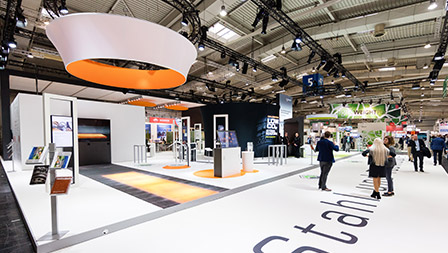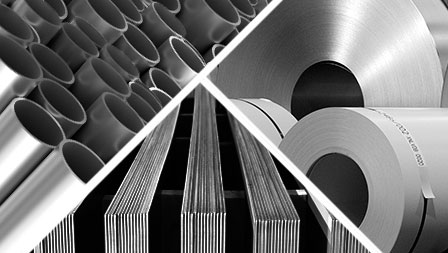Questions & Answers
Questions regarding the Salzgitter Group
- In which fields is the Salzgitter Group engaged?
- How many employees does the Salzgitter Group have?
- What are the Group's principal products and services?
- What are the Group's principal markets?
- What are the effects of variations in US dollar exchange rates?
- What importance does the Salzgitter Group attach to the protection of the environment?
- What priority is accorded to research and development at the Salzgitter Group?
- What is the period covered by the financial year?
- In accordance with which accounting principles are the statements prepared?
- Is the supply of raw materials for Salzgitter AG secured?
1. In which fields is the Salzgitter Group engaged?
The four business units of Steel Production, Steel Processing, Trading and Technology operate under the management holding.
2. How many employees does the Salzgitter Group have?
The Salzgitter Group has more than 24,000 employees.
3. What are the Group's principal products and services?
Steel Production Business Unit:
Hot-rolled wide strip, cold-rolled sheet, electro-galvanized, hot-dip galvanized and organically coated sheet, tailored blanks and structural elements for large buildings and steel service centers, medium-sized and heavy beams
Steel Processing Business Unit:
Heavy plate, large-diameter pipes respectively pipes for pipelines, medium line pipes, cold-finished tubes, precision tubes and stainless steel tubes
Trading Business Unit:
Three distribution channels ensure a global presence: stockholding, steel service centers and the international trading
Technology Business Unit:
Filling and packaging lines for the food and non-food industries, injection molding machines and plants for the direct soling of shoes
Industrial Participations/Consolidation:
Concentration of the Group's expertise, for instance in the areas of logistics, telecommunications, data processing, mechanical engineering, hydroformed products and engineering
4. What are the Group's principal markets?
The steel companies sell predominantly to customers in Germany and Europe. The tubes, trading and technology businesses serve the global market.
5. What are the effects of variations in US dollar exchange rates?
Raw materials are purchased for the business units in US dollar. A strong euro has a positive impact on the procurement of iron ore and coal, for instance. In addition, the business units offer a designated part of their products to dollar-denominated markets. On the sales side, a strong euro hampers competition with producers outside Europe. We hedge foreign currencies wherever possible and expedient. Nonetheless, exchange rate fluctuations can affect the Group’s earnings.
6. What importance does the Salzgitter Group attach to the protection of the environment?
Salzgitter AG attaches high priority to environmental protection and invests considerable funds each year to this end. In addition, efforts are being made to achieve DIN EN ISO 14001 certification for the environmental management systems in place at all business units. Actions taken to protect the environment include on the one hand the reduction of emissions and on the other the optimization of materials recycling.
7. What priority is accorded to research and development at the Salzgitter Group?
As a steel and technology group, the Salzgitter AG regards the capacity to innovate as a significant competitive advantage.
Activities at Salzgitter Mannesmann Forschung GmbH are geared to the development of new material grades and qualities, as well as innovative material and product applications. In this way we are not only able to offer our customers an extensive product portfolio, but also provide comprehensive technology consulting.
These endeavors are paralleled by close cooperative arrangements with universities and non-academic research institutions.
8. What is the period covered by the financial year?
The financial year covered both by the individual financial statements for Salzgitter AG itself and by the consolidated Group financial statements is identical with the calendar year: January 01 to December 31.
9. In accordance with which accounting principles are the statements prepared?
With effect from the financial year 99/00, the consolidated Group financial statements were converted from German Commercial Code [HGB] standards to the international financial reporting standards IFRS. The individual statements for Salzgitter AG continue to be prepared in accordance with the German Commercial Code [HGB].
10. Is the supply of raw materials for Salzgitter AG secured?
Salzgitter AG procures its raw materials (ore, coking coal, alloys) globally. Emphasis is placed on remaining independent of one particular supplier as well as to align supply and distribution contract durations to the greatest possible extent. The Steel Production Business Unit has its own coking plant and is therefore procuring only marginal quantities of coke from external sources.
1. When will the next Annual General Meeting take place?
The date of the next Annual General Meeting as well as of other events with significance to the financial markets are published in the Financial Calendar.
2. How and where may Shareholders register for the General Meeting?
Shareholders will receive an invitation and agenda in advance of the General Meeting via their depositary banks, with the opportunity either to appoint the bank to exercise their voting rights or request the depositary bank to provide them and/or a representative with a ticket to attend the meeting.
For organizational reasons, the company unfortunately cannot issue invitations directly to shareholders.
3. When is the dividend disbursed?
The dividend is paid on the next working day following the General Meeting.
1. Can I have my shares delivered directly to me?
No, such delivery is not possible. In accordance with Article 3, No. 3 of our Articles of Incorporation, any entitlement on the part of a shareholder to the certification of shares is excluded.
2. Where are Salzgitter AG shares traded?
Salzgitter AG shares are listed in official trading on the stock exchanges in Frankfurt am Main, XETRA, and Hanover, and in OTC trading on other German stock exchanges (Bremen is currently deactivated).
3. Where can I purchase Salzgitter AG shares?
You can purchase Salzgitter shares via your bank. The German Securities Identification Number (WKN) is 620200. The International Securities Identification Number (ISIN) is DE0006202005.
4. In which indices is Salzgitter AG stock included?
Salzgitter AG is listed in various indices, the most relevant of which as of June 2010 are briefly highlighted as follows:
Deutsche Börse only lists companies in their major share indices, which report according to the Prime Standard publication guidelines. The ranking within an index depends upon the free-float market capitalization and the share turnover. Salzgitter AG satisfies the Prime Standard requirements and is listed among others in the SDAX, CDAX, HDAX, and Prime All Share.
















